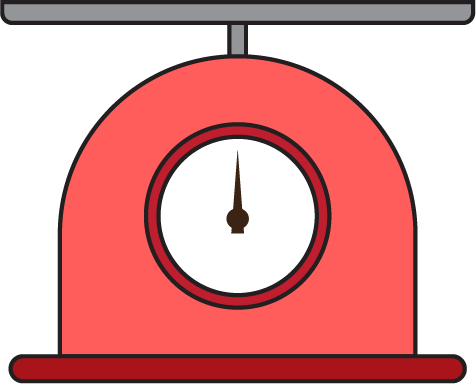Menu

You are now halfway through your first trimester at week 7. You are one month and three weeks pregnant. So you now have about 7 months and one week left to complete your exciting journey of pregnancy and your baby is 10,000 times bigger than they were at conception.
The umbilical cord which connects the baby and the placenta is fully formed. It supplies nutrients and oxygen to your baby and removes waste products.
The mucus plug develops this week. It is a collection of mucus formed in the cervical canal and settles at the cervix entrance. It protects your baby and the uterus from bacterial infections.
Your baby is growing. Your little one’s hands and feet, which look more like small paddles, are sprouting.
The umbilical cord which connects the baby and the placenta is fully formed. It supplies nutrients and oxygen to your baby and removes waste products.
The mucus plug develops this week. It is a collection of mucus formed in the cervical canal and settles at the cervix entrance. It protects your baby and the uterus from bacterial infections.
Your baby is growing. Your little one’s hands and feet, which look more like small paddles, are sprouting.
Around week 7 of pregnancy, your baby, also called an embryo, undergoes significant developmental changes. The brain experiences rapid growth, resulting in a pronounced forehead and generates approximately 100 new brain cells every minute.
The umbilical cord has developed, serving as the vital connection between you and your baby throughout pregnancy. This cord acts as a lifeline, delivering oxygen and essential nutrients to your baby while removing waste products. The digestive tract and lungs continue to take shape.
The tiny arm and leg buds forming earlier are now growing more. Also, your baby’s head and face are becoming more detailed. They’re starting to develop a mouth and tongue. These changes show that your baby is becoming more human-like, with important body parts taking shape.






It’s unlikely that people around you can tell you’re pregnant. You might have gained a few pounds, but losing weight is possible, especially if you’re experiencing morning sickness. Losing weight early isn’t uncommon, and things will likely shift in the opposite direction in the coming weeks. Additionally, you might be experiencing other early pregnancy symptoms, which vary from person to person.
During pregnancy, your cervix undergoes various changes to accommodate the growing baby. By this week, you’ll have formed a mucus plug, which develops in the opening of the cervical canal. This plug acts as a barrier, sealing off the uterus to safeguard it from potential infections. Later on, as your body prepares for labour, your cervix will dilate, and you’ll lose this plug.

Morning sickness may become stronger at week 7 of pregnancy. Hang in there and try various methods to cope. Some expectant moms find relief from their tummy troubles by using ginger, Vitamin B6 supplements, or acupressure wristbands.
Remember that the nausea should lessen or vanish altogether as your hormones level out in the second trimester. If you’re expecting twins, you might find yourself experiencing more intense nausea and vomiting due to heightened hormone levels.

You might notice strong cravings for specific or unusual foods or suddenly feel repelled by foods you once enjoyed. It’s perfectly normal to give in to your cravings occasionally, but it’s essential to maintain balance and make healthy food choices whenever possible.

Even though your baby is still very small. Your uterus is enlarged and still in the pelvis, pressing against the bladder. This makes it difficult for the bladder to expand fully when it’s full, leading to frequent urination.

You may experience fatigue this week due to the effect of progesterone. Progesterone is a pregnancy hormone that helps the uterus grow and prepares it for pregnancy. This hormone causes more tiredness than usual. This week, feeling dizzy and an increased urge to sleep are some of the symptoms.

You’re not alone if you notice stronger smells than usual during pregnancy. Many expectant mothers experience a heightened sense of smell, which can make certain odours more intense and even trigger feelings of nausea. This sensitivity is believed to be linked to hormonal changes in your body.

Hormonal fluctuations can cause your breasts to become tender, swollen, or even sore to the touch. This is a common symptom of early pregnancy and is caused by increased blood flow and hormonal changes in preparation for breastfeeding.

Experiencing excessive salivation and the urge to spit can be irritating during pregnancy, especially at this stage. While the exact cause is uncertain, hormonal changes and heartburn are potential factors.
To manage this symptom, avoid irritants such as smoke that could exacerbate it. Chewing sugarless gum or sucking on hard candies may help by stimulating saliva production and making it easier to swallow the excess saliva.

At 7 weeks of pregnancy, noticing vaginal discharge is entirely normal. This discharge, known as leukorrhea, is typically thin, milky white, and has a mild odour. It serves several important functions, including maintaining the pH balance of the vagina, preventing infections, and protecting the reproductive organs.
However, if the discharge is accompanied by itching, burning, a foul odour, or colour changes, it could be a sign of infection, and it’s important to consult with a healthcare provider for further evaluation and treatment.

Experiencing heartburn and indigestion at 7 weeks pregnant is not uncommon. These symptoms can be attributed to hormonal changes, specifically an increase in progesterone, which relaxes the muscles in the digestive tract, slowing down digestion.
While uncomfortable, there are strategies to help alleviate heartburn and indigestion during pregnancy, such as eating smaller, more frequent meals, avoiding spicy or fatty foods and staying upright after eating.

Chloasma, also known as melasma or the “mask of pregnancy,” is a common skin condition characterised by the development of dark patches on the face due to hormonal changes during pregnancy. While not harmful, it can affect a woman’s self-confidence.
It’s essential to protect the skin from the sun by wearing sunscreen and avoiding prolonged sun exposure to prevent further darkening of the patches.

Morning sickness may become stronger at week 7 of pregnancy. Hang in there and try various methods to cope. Some expectant moms find relief from their tummy troubles by using ginger, Vitamin B6 supplements, or acupressure wristbands.
Remember that the nausea should lessen or vanish altogether as your hormones level out in the second trimester. If you’re expecting twins, you might find yourself experiencing more intense nausea and vomiting due to heightened hormone levels.

ou might notice strong cravings for specific or unusual foods or suddenly feel repelled by foods you once enjoyed. It’s perfectly normal to give in to your cravings occasionally, but it’s essential to maintain balance and make healthy food choices whenever possible.

Even though your baby is still very small. Your uterus is enlarged and still in the pelvis, pressing against the bladder. This makes it difficult for the bladder to expand fully when it’s full, leading to frequent urination.

You may experience fatigue this week due to the effect of progesterone. Progesterone is a pregnancy hormone that helps the uterus grow and prepares it for pregnancy. This hormone causes more tiredness than usual. This week, feeling dizzy and an increased urge to sleep are some of the symptoms.

You’re not alone if you notice stronger smells than usual during pregnancy. Many expectant mothers experience a heightened sense of smell, which can make certain odours more intense and even trigger feelings of nausea. This sensitivity is believed to be linked to hormonal changes in your body.

Hormonal fluctuations can cause your breasts to become tender, swollen, or even sore to the touch. This is a common symptom of early pregnancy and is caused by increased blood flow and hormonal changes in preparation for breastfeeding.

Experiencing excessive salivation and the urge to spit can be irritating during pregnancy, especially at this stage. While the exact cause is uncertain, hormonal changes and heartburn are potential factors.
To manage this symptom, avoid irritants such as smoke that could exacerbate it. Chewing sugarless gum or sucking on hard candies may help by stimulating saliva production and making it easier to swallow the excess saliva.

At 7 weeks of pregnancy, noticing vaginal discharge is entirely normal. This discharge, known as leukorrhea, is typically thin, milky white, and has a mild odour. It serves several important functions, including maintaining the pH balance of the vagina, preventing infections, and protecting the reproductive organs.
However, if the discharge is accompanied by itching, burning, a foul odour, or colour changes, it could be a sign of infection, and it’s important to consult with a healthcare provider for further evaluation and treatment.

Experiencing heartburn and indigestion at 7 weeks pregnant is not uncommon. These symptoms can be attributed to hormonal changes, specifically an increase in progesterone, which relaxes the muscles in the digestive tract, slowing down digestion.
While uncomfortable, there are strategies to help alleviate heartburn and indigestion during pregnancy, such as eating smaller, more frequent meals, avoiding spicy or fatty foods and staying upright after eating.

Chloasma, also known as melasma or the “mask of pregnancy,” is a common skin condition characterised by the development of dark patches on the face due to hormonal changes during pregnancy. While not harmful, it can affect a woman’s self-confidence.
It’s essential to protect the skin from the sun by wearing sunscreen and avoiding prolonged sun exposure to prevent further darkening of the patches.
Early medical care is important to avoid miscarriage during this week. Miscarriage may occur without you noticing. This is one reason why medical care/checkups are very important.
Having an ectopic pregnancy at this stage is now much more dangerous. The more advanced the pregnancy becomes, the higher the probability of a rupture. An ultrasound scan will easily detect this. Most women will not have any symptoms before a rupture occurs. This is one of the reasons why it’s important to go for a prenatal checkup as soon as you discover you’re pregnant. A rupture is bad for the fallopian tube and endangers a woman’s life.
You become more prone to getting a Urinary tract infection from the sixth week of pregnancy. Holding your urine when you have the urge to pee increases your chances of coming down with a UTI. A burning sensation during urination is a sign of a UTI. If you notice this, your caregiver should be immediately notified.
Excessive vomiting and nausea, called hyperemesis gravidarum, may occur if a woman is having multiple babies. It may also occur in a condition called a molar pregnancy. A molar pregnancy is an abnormal pregnancy where there is no baby. Please note that the vomiting you think is excessive may not be excessive, but to be on the safe side, please consult your caregiver if you think you vomit too much.

If you notice yourself craving non-food items such as dirt or clay during pregnancy, discussing this with your doctor is essential. This phenomenon is known as pica, which involves a compulsion to consume substances that aren’t food and lack nutritional value. Your doctor will likely conduct tests to assess your iron and zinc levels to determine if essential vitamins are deficient.

Healthy meals will nourish you and your baby. This might be a little bit difficult for some women who regularly crave junk food. Healthy meals will keep you at the right weight for pregnancy. Being underweight or overweight may harm you and your baby.

Drinking lots of water helps with constipation, as well as the issue of bloating. Drinking enough water will keep you hydrated during this period of pregnancy.

Take all vitamins, supplements, and other medications prescribed by your obstetrician or midwife. You must also stop all medications advised against by the midwife or obstetrician. Some medications might disrupt the normal development of your baby, and others may cause a miscarriage.

Your skin may be experiencing changes at this time, but starting new, intense skincare routines is not advisable. Instead, focus on gentle care by washing your skin twice daily with a mild cleanser to address acne and using a gentle moisturiser to alleviate flakiness.
If you’re dealing with chloasma, characterised by dark skin patches, it’s essential to regularly apply SPF 30+ sunscreen and wear a hat outdoors to protect your skin from further pigmentation.

Activities such as drinking, smoking, or handling cat faeces may be harmful to your baby at this early stage. It would be best to avoid these activities to prevent miscarriage and abnormal development of your baby’s organs.

Maintaining a low-impact exercise regimen during pregnancy is crucial, but it’s equally important to listen to your body and rest when you feel fatigued. Your body is undergoing significant changes as it works to prepare and nurture your growing baby, requiring additional energy and resources. Pushing yourself too hard when you’re tired can lead to increased fatigue and potential strain on your body.

If you notice yourself craving non-food items such as dirt or clay during pregnancy, discussing this with your doctor is essential. This phenomenon is known as pica, which involves a compulsion to consume substances that aren’t food and lack nutritional value. Your doctor will likely conduct tests to assess your iron and zinc levels to determine if essential vitamins are deficient.

Healthy meals will nourish you and your baby. This might be a little bit difficult for some women who regularly crave junk food. Healthy meals will keep you at the right weight for pregnancy. Being underweight or overweight may harm you and your baby.

Drinking lots of water helps with constipation, as well as the issue of bloating. Drinking enough water will keep you hydrated during this period of pregnancy.

Take all vitamins, supplements, and other medications prescribed by your obstetrician or midwife. You must also stop all medications advised against by the midwife or obstetrician. Some medications might disrupt the normal development of your baby, and others may cause a miscarriage.

Your skin may be experiencing changes at this time, but starting new, intense skincare routines is not advisable. Instead, focus on gentle care by washing your skin twice daily with a mild cleanser to address acne and using a gentle moisturiser to alleviate flakiness.
If you’re dealing with chloasma, characterised by dark skin patches, it’s essential to regularly apply SPF 30+ sunscreen and wear a hat outdoors to protect your skin from further pigmentation.

Activities such as drinking, smoking, or handling cat faeces may be harmful to your baby at this early stage. It would be best to avoid these activities to prevent miscarriage and abnormal development of your baby’s organs.

Maintaining a low-impact exercise regimen during pregnancy is crucial, but it’s equally important to listen to your body and rest when you feel fatigued. Your body is undergoing significant changes as it works to prepare and nurture your growing baby, requiring additional energy and resources. Pushing yourself too hard when you’re tired can lead to increased fatigue and potential strain on your body.
Your pregnant partner may feel fatigued during this period so it’s essential to encourage them to rest and take regular naps. Consider allowing them to sleep in when possible and surprising them with a delicious breakfast in bed. Let your partner know you’re taking care of household chores while they rest so they can fully relax and recharge.
Showing support this way can make a significant difference in helping your partner manage their fatigue and feel appreciated during this time of heightened physical demands.
It’s also important for partners to discuss and decide which prenatal appointments to attend together. Some couples prefer attending every appointment, while others may choose to join for significant ones, such as sonograms.
Start by planning which appointments to attend and mark them on your calendar. Being supportive and involved in the prenatal care journey is crucial for the mother and the baby’s well-being.
At week 7, your baby is very small. It measures about 0.51 inches in length and weighs around 1.1 grams.
Your baby is still very small. Although your uterus is enlarging, it has yet to leave the pelvis, so there would be no baby bump yet. Baby bumps typically start becoming noticeable around 12 to 16 weeks into pregnancy.
During the early stages, any changes in your abdomen are more likely due to factors such as bloating rather than the growing baby. As pregnancy progresses and the uterus expands, the baby bump will become more apparent.
Your baby is still very small. Although your uterus is enlarging, it has yet to leave the pelvis, so there is no baby bump yet.
Most pregnant women can travel safely until close to their due dates, but this may not be recommended if there are complications with the pregnancy. It’s crucial to consult with your obstetrician-gynaecologist (ob-gyn) before making any travel plans during pregnancy.
According to the American College of Obstetricians and Gynecologists, the optimal time for travelling during pregnancy is typically between 14 to 28 weeks. During this period, you may experience a return of energy, an improvement or cessation of morning sickness, and find it easier to move around comfortably.
However, beyond 28 weeks, mobility may become more challenging, and sitting for extended periods may be uncomfortable.
At week 7, it’s unlikely that people around you can tell you’re pregnant. You might have gained a few pounds, but losing weight is possible, especially if you’re experiencing morning sickness. You might also be experiencing other early pregnancy symptoms, which vary from person to person.
During pregnancy, your cervix undergoes various changes to accommodate the growing baby. By this week, you’ll have formed a mucus plug, which develops in the opening of the cervical canal. This plug acts as a barrier, sealing off the uterus to safeguard it from potential infections.
According to the Centers for Disease Control and Prevention (CDC), consuming alcohol during pregnancy poses significant risks to the developing foetus as alcohol passes through the umbilical cord. This can lead to various adverse outcomes, including miscarriage, stillbirth, and a range of physical, behavioural, and intellectual disabilities in the baby. The CDC emphasises that no amount of alcohol has been deemed safe during pregnancy.
At week 7, your baby is very small. It measures about 0.51 inches in length and weighs around 1.1 grams.
Your baby is still very small. Although your uterus is enlarging, it has yet to leave the pelvis, so there would be no baby bump yet. Baby bumps typically start becoming noticeable around 12 to 16 weeks into pregnancy.
During the early stages, any changes in your abdomen are more likely due to factors such as bloating rather than the growing baby. As pregnancy progresses and the uterus expands, the baby bump will become more apparent.
Your baby is still very small. Although your uterus is enlarging, it has yet to leave the pelvis, so there is no baby bump yet.
Most pregnant women can travel safely until close to their due dates, but this may not be recommended if there are complications with the pregnancy. It’s crucial to consult with your obstetrician-gynaecologist (ob-gyn) before making any travel plans during pregnancy.
According to the American College of Obstetricians and Gynecologists, the optimal time for travelling during pregnancy is typically between 14 to 28 weeks. During this period, you may experience a return of energy, an improvement or cessation of morning sickness, and find it easier to move around comfortably.
However, beyond 28 weeks, mobility may become more challenging, and sitting for extended periods may be uncomfortable.
At week 7, it’s unlikely that people around you can tell you’re pregnant. You might have gained a few pounds, but losing weight is possible, especially if you’re experiencing morning sickness. You might also be experiencing other early pregnancy symptoms, which vary from person to person.
During pregnancy, your cervix undergoes various changes to accommodate the growing baby. By this week, you’ll have formed a mucus plug, which develops in the opening of the cervical canal. This plug acts as a barrier, sealing off the uterus to safeguard it from potential infections.
According to the Centers for Disease Control and Prevention (CDC), consuming alcohol during pregnancy poses significant risks to the developing foetus as alcohol passes through the umbilical cord. This can lead to various adverse outcomes, including miscarriage, stillbirth, and a range of physical, behavioural, and intellectual disabilities in the baby. The CDC emphasises that no amount of alcohol has been deemed safe during pregnancy.
1. American College of Obstetricians and Gynecologists. Travel During Pregnancy.
2. American Pregnancy Association. 7 weeks pregnant.
3. Center for Disease Prevention and Control. Alcohol use in pregnancy.
4. Ebrahimi, N., Maltepe, C. and Einarson, A., 2010. Optimal management of nausea and vomiting of pregnancy. International journal of women’s health, pp.241-248.
5. Glick, M.M. and Dick, E.L., 1999. Molar pregnancy presenting with hyperemesis gravidarum. Journal of Osteopathic Medicine, 99(3), pp.162-162.
6. Healthline. 7 Weeks Pregnant: Symptoms, Tips, and More.
7. Let’s Talk Birth and Baby. Pregnancy week 7
8. Loh KY, Sivalingam N. Urinary tract infections in pregnancy. Malaysian family physician: the official journal of the Academy of Family Physicians of Malaysia. 2007;2(2):54.
9. Medical News Today. Your pregnancy at 7 weeks.
10. Nemours Kids Health. Week 7.
11. NHS. Week 7
12. Now baby. Week 7 of pregnancy
13. Sivalingam, V.N., Duncan, W.C., Kirk, E., Shephard, L.A. and Horne, A.W., 2011. Diagnosis and management of ectopic pregnancy. Journal of family planning and reproductive health care, 37(4), pp.231-240.
© Mindsmaking 2024